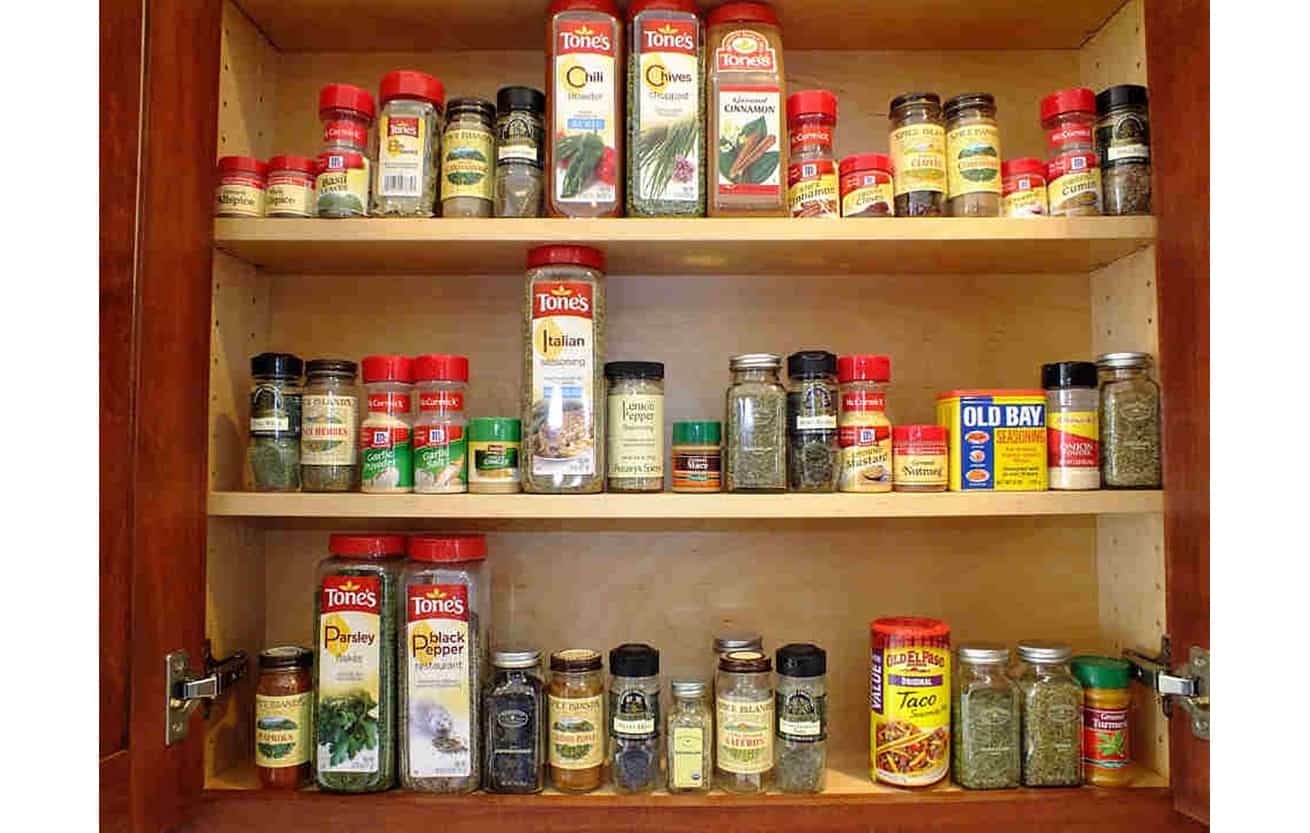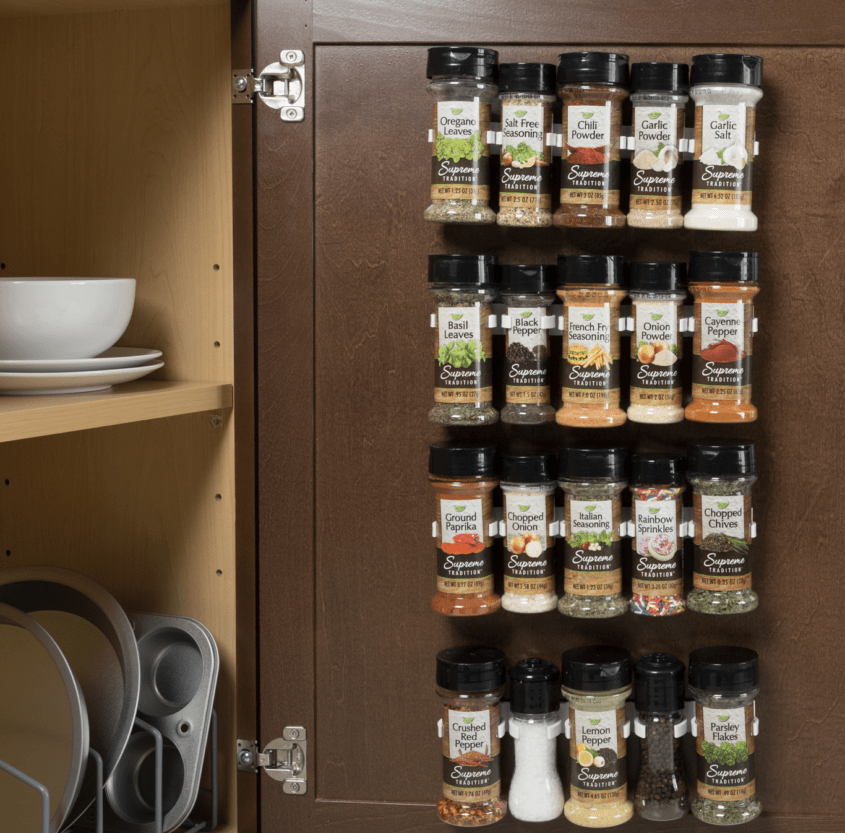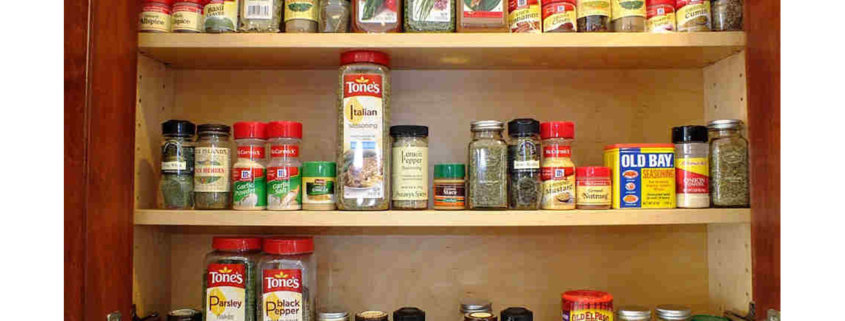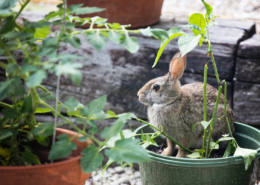The Useful Life of Spice Plus How to Repurpose
When I packed up my kitchen for our big move a few years ago, I was embarrassed to discover what I had accumulated in the spice cupboard.
I’m pretty sure there were a couple of bottles of something or other in there that were certified antiques, pre-dating the Nixon administration. And that ground allspice? I think the sell-by date was 50 A.D.

Do spices expire?
The useful life of spices and dried herbs vary but you don’t have to worry about them going bad like other foods. The problem? Over time they can lose flavor, which is the reason we use them at all.
A bottle of curry powder you’ve had for an untold number of years won’t make you sick. But it won’t be as potent and flavorful as when it was fresh. Spices, especially once ground, degrade over time.
As I researched to get to the bottom of this question, I found a reference to an unsupported rule of thumb floating around out there that says we should use or toss herbs and spices after 6 months. What?! That seems a bit short to me. I can’t afford to purge my spice drawer twice a year, which prompted me to check further, with more reliable resources.
Pros weigh in
The folks at McCormick, who put a “best by” date on products offer these more-generous-than-every-six-months guidelines:
- Ground spices (nutmeg, cinnamon, turmeric): 2 to 3 years
- Herbs of basil, oregano, parsley: 1 to 3 years
- Seasoning blends, marinades, and sauces: 1 to 2 years
- Whole spices like cloves, peppercorns, cinnamon sticks: 4 years
- Seeds: 4 years except for poppy and sesame seeds, which should be discarded after 2 years
- Extracts: 4 years except for vanilla, which will last forever
Sniff test
I much prefer the sniff test. Open the container and take a sniff. If the smell doesn’t match what the label says—or it’s so weak you have to work at smelling anything—you can be pretty sure that spice will not be any more appealing in the dish you’re preparing.
Salt
According to Morton, regular table salt never expires, but once they add other factors—like iodine—it changes the equation; iodized salt will last for about five years.
Sugar
The folks at Domino say that sugar because it cannot support microbes, has an indefinite useful life.
Cornstarch
Both Argo and Kingsford tell us that cornstarch provided it is kept sealed in a dry place, is good for at least three years.
Baking soda
Same for baking soda, says Arm and Hammer, provided it, too, is kept well sealed in a dry place.
Baking powder
Clabber Girl baking powder comes within an expiration date on the bottom of the can, which is two years after the date it was manufactured. But the company goes on to warn that baking powder can quickly lose its ability to leaven if it meets up with moisture.
In a fairly humid area, baking powder should be used or replaced after one year, not because it will go rancid, but because it won’t make those biscuits light and fluffy rise the way you intend!
Baking powder, baking soda, or corn starch should be stored in a dry cupboard away from heat and excess moisture. You should only measure with a dry utensil and replace the lid promptly after each use. If you use a utensil that has any moisture on it, you can cause a reaction inside the can and your baking powder may not work properly. Storage in a refrigerator or freezer is not recommended, as the condensation from your refrigerator can also cause moisture to form inside the can, causing a reaction.
Use your common sense
If the cinnamon still smells lovely but doesn’t seem quite as potent as when it was new, add a bit more than the recipe calls for.
Consider buying spices from a store that sells in bulk, then buy only the amount you will reasonably use in the next six months or so.
Though it’s best to keep spices inside a dry, dark cabinet, away from light. If you must, you can store larger backup supplies in the freezer, generally for up three years.
When possible it is always best to purchase smaller amounts of spices instead of buying in quantities greater than you will use in a reasonable period of time.
Give them a second chance
As for what to do with herbs and spices that truly have exceeded their useful life, here are some clever ideas for how to repurpose them:

Freshen Carpet
Over-the-hill spices can freshen your carpet, your vacuum too. Mix an assortment of old spices like cinnamon, thyme, cloves, and nutmeg—or a blend of rosemary and ginger. Sprinkle on the carpet and then vacuum.
Pro Tip
Always test first in an inconspicuous place to make sure the color from the spices won’t stain the carpet.
Repel bugs
Spices with strong or pungent smells will often repel insects. For example, ants’ worst enemy is spice—pepper, oregano sage, and peppermint.
Guard the garden
Hot spices like cayenne and chili powder make our eyes water, right? Well, imagine how they might affect rabbits, squirrels, and other critters bent on eating all the goodies in your garden. Try sprinkling those hot spices to entice pesky predators to go elsewhere.
Non-edible tree ornaments
Cookie-like ornaments will add charm and fragrance to holiday decor.
Spiced candles
If you’re into making homemade candles, you can put your old spices to work to scent those candles. Start with a basic candle-making recipe then add a tablespoon of pleasant-smelling spice to the candle mixture. But sure to use ground spices though, as whole spices could create a fire hazard.
Freshen and deodorize
Even if those spices have lost oomph for cooking, simmered in water can release the last bits of volatile oils, giving off a lovely subtle aroma. Simmer a pot of water into which you’ve dropped any combination of spices to make the house smell fantastic and deodorize the air. Cardamom, cinnamon, cloves, and ginger are great choices.
Revised Updated 5-22-21

















Though chili powder is effective at keeping rabbits and squirrels from nibbling on your garden, you should know that if they get it in their eyes, it can cause blindness. It gets on their fur, and as they clean themselves off, it can get in their eyes as well. I’ve also heard of cases where these animals have actually scratched their eyes out from the pain. Birds can also be harmed if you use it on their seed to keep squirrels from stealing it, as birds too can get it in their eyes. And if your pets like to root around the area, they too are at risk of getting it in their eyes.
And if none of these end of life techniques appeal, add old spices/spice blends/herbs to your compost pile (except for those with salt added)
Good to know! Thanks for the helpful info.
During the pandemic my local “healthy” store has stopped selling spices in bulk. This had me wondering about the safety and freshness of spices and other things sold in bulk from a bin in the store. There’s no way to know it hasn’t been tampered with or has bugs in it. How fresh is it. Do they just dump new product on top of the old or empty and clean the bin? Just wondering……
Kay, I’ve often (pre pandemic) wondered that myself. I’ll see what I can learn. Although … I’m sure every store that offers the open bin build products have their unique ways of managing them. Personally, I’ve only purchased from bulk bins items that will be an ingredient in a dish or item that will be cooked to a temp sufficient to take care of the potential problem. As for freshness, I think that’s anyone’s bet.